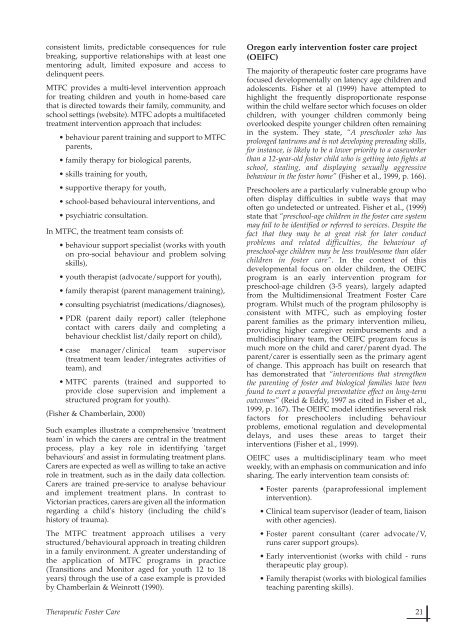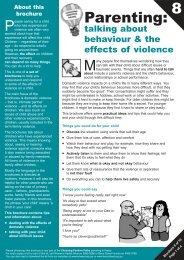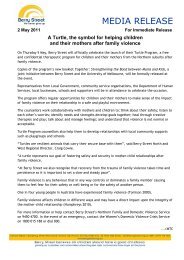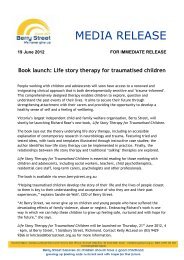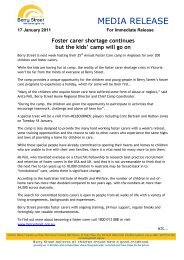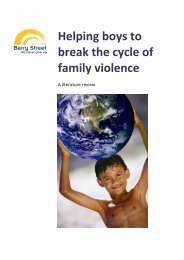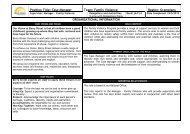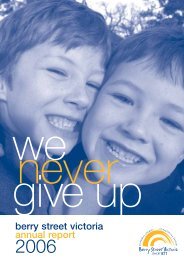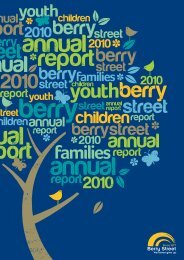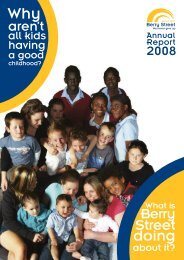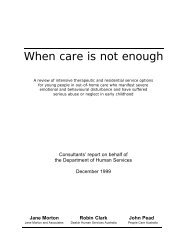Therapeutic foster care - Berry Street Childhood Institute
Therapeutic foster care - Berry Street Childhood Institute
Therapeutic foster care - Berry Street Childhood Institute
You also want an ePaper? Increase the reach of your titles
YUMPU automatically turns print PDFs into web optimized ePapers that Google loves.
consistent limits, predictable consequences for rule<br />
breaking, supportive relationships with at least one<br />
mentoring adult, limited exposure and access to<br />
delinquent peers.<br />
MTFC provides a multi-level intervention approach<br />
for treating children and youth in home-based <strong>care</strong><br />
that is directed towards their family, community, and<br />
school settings (website). MTFC adopts a multifaceted<br />
treatment intervention approach that includes:<br />
• behaviour parent training and support to MTFC<br />
parents,<br />
• family therapy for biological parents,<br />
• skills training for youth,<br />
• supportive therapy for youth,<br />
• school-based behavioural interventions, and<br />
• psychiatric consultation.<br />
In MTFC, the treatment team consists of:<br />
• behaviour support specialist (works with youth<br />
on pro-social behaviour and problem solving<br />
skills),<br />
• youth therapist (advocate/support for youth),<br />
• family therapist (parent management training),<br />
• consulting psychiatrist (medications/diagnoses),<br />
• PDR (parent daily report) caller (telephone<br />
contact with <strong>care</strong>rs daily and completing a<br />
behaviour checklist list/daily report on child),<br />
• case manager/clinical team supervisor<br />
(treatment team leader/integrates activities of<br />
team), and<br />
• MTFC parents (trained and supported to<br />
provide close supervision and implement a<br />
structured program for youth).<br />
(Fisher & Chamberlain, 2000)<br />
Such examples illustrate a comprehensive 'treatment<br />
team' in which the <strong>care</strong>rs are central in the treatment<br />
process, play a key role in identifying 'target<br />
behaviours' and assist in formulating treatment plans.<br />
Carers are expected as well as willing to take an active<br />
role in treatment, such as in the daily data collection.<br />
Carers are trained pre-service to analyse behaviour<br />
and implement treatment plans. In contrast to<br />
Victorian practices, <strong>care</strong>rs are given all the information<br />
regarding a child's history (including the child's<br />
history of trauma).<br />
The MTFC treatment approach utilises a very<br />
structured/behavioural approach in treating children<br />
in a family environment. A greater understanding of<br />
the application of MTFC programs in practice<br />
(Transitions and Monitor aged for youth 12 to 18<br />
years) through the use of a case example is provided<br />
by Chamberlain & Weinrott (1990).<br />
Oregon early intervention <strong>foster</strong> <strong>care</strong> project<br />
(OEIFC)<br />
The majority of therapeutic <strong>foster</strong> <strong>care</strong> programs have<br />
focused developmentally on latency age children and<br />
adolescents. Fisher et al (1999) have attempted to<br />
highlight the frequently disproportionate response<br />
within the child welfare sector which focuses on older<br />
children, with younger children commonly being<br />
overlooked despite younger children often remaining<br />
in the system. They state, “A preschooler who has<br />
prolonged tantrums and is not developing prereading skills,<br />
for instance, is likely to be a lower priority to a caseworker<br />
than a 12-year-old <strong>foster</strong> child who is getting into fights at<br />
school, stealing, and displaying sexually aggressive<br />
behaviour in the <strong>foster</strong> home” (Fisher et al., 1999, p. 166).<br />
Preschoolers are a particularly vulnerable group who<br />
often display difficulties in subtle ways that may<br />
often go undetected or untreated. Fisher et al., (1999)<br />
state that “preschool-age children in the <strong>foster</strong> <strong>care</strong> system<br />
may fail to be identified or referred to services. Despite the<br />
fact that they may be at great risk for later conduct<br />
problems and related difficulties, the behaviour of<br />
preschool-age children may be less troublesome than older<br />
children in <strong>foster</strong> <strong>care</strong>”. In the context of this<br />
developmental focus on older children, the OEIFC<br />
program is an early intervention program for<br />
preschool-age children (3-5 years), largely adapted<br />
from the Multidimensional Treatment Foster Care<br />
program. Whilst much of the program philosophy is<br />
consistent with MTFC, such as employing <strong>foster</strong><br />
parent families as the primary intervention milieu,<br />
providing higher <strong>care</strong>giver reimbursements and a<br />
multidisciplinary team, the OEIFC program focus is<br />
much more on the child and <strong>care</strong>r/parent dyad. The<br />
parent/<strong>care</strong>r is essentially seen as the primary agent<br />
of change. This approach has built on research that<br />
has demonstrated that “interventions that strengthen<br />
the parenting of <strong>foster</strong> and biological families have been<br />
found to exert a powerful preventative effect on long-term<br />
outcomes” (Reid & Eddy, 1997 as cited in Fisher et al.,<br />
1999, p. 167). The OEIFC model identifies several risk<br />
factors for preschoolers including behaviour<br />
problems, emotional regulation and developmental<br />
delays, and uses these areas to target their<br />
interventions (Fisher et al., 1999).<br />
OEIFC uses a multidisciplinary team who meet<br />
weekly, with an emphasis on communication and info<br />
sharing. The early intervention team consists of:<br />
• Foster parents (paraprofessional implement<br />
intervention).<br />
• Clinical team supervisor (leader of team, liaison<br />
with other agencies).<br />
• Foster parent consultant (<strong>care</strong>r advocate/V,<br />
runs <strong>care</strong>r support groups).<br />
• Early interventionist (works with child - runs<br />
therapeutic play group).<br />
• Family therapist (works with biological families<br />
teaching parenting skills).<br />
<strong>Therapeutic</strong> Foster Care 21


